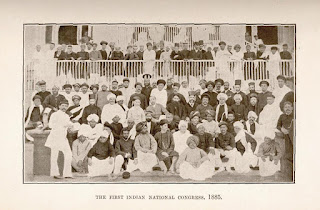Manimekalai is an epic which is a sequel to an earlier text called Silappadikaram, which was a love story. This text was composed in around the 6th century.
This blog is a comprehensive and in-depth guide to the events, people and places throughout the history of India
Sunday, December 29, 2024
Today In Indian History (30 December)
1906: The All India Muslim League is founded in Dacca which later laid down the foundations of Pakistan.
1943 – Subhash Chandra Bose raises the flag of Indian independence at Port Blair
Jivaka Cintamani: One of the Five Epics in Tamil
Jivaka Cintamani (also known as Civaka Cintamani) is a Tamil poem written by a Jain ascetic Tiruttakrdeva in the 10th century. This Jain epic is considered one of the five classic Tamil epics. The poem means “fabulous gem” and is also known as Mana Nool (Book of Marriages).
According to the experts, Jivaka Cintamani served as a poetic model for Kamban's Ramayana, the first Tamil Ramayana.
Caeser Frederick: Venetian Visitor to Vijayanagar
Caeser Frederick or Caesaro Federici was a Venetian traveller who had visited the Vijayanagara empire just after the Battle of Rakshasa Tangadi or Talikota in 1565, in which Vijayanagar army was defeated by the combined forces of the five Muslim Sultanates of Deccan. After this battle the Vijayanagara kingdom lost its grandeur and glory. During his travel to the Vijayanagara empire Sadasiva Raya was the ruler of this Hindu Kingdom in South India.
Caeser Frederick had visted the Sandwip island (now near Barisal in Bangladesh) which he found densely inhabited. He mentioned that Sandwip was famous for its salt and ship-building manufacturing.
From Bengal Frederick journeyed to Pegu (Myanmar) and a number of other places before returning to Venice in 1581.
Saturday, December 28, 2024
Today in Indian History (29th December)
- Womesh Chunder Bonnerjee or Umesh Chandra Banerjee, the first president of Indian National Congress in 1885, is born in Calcutta. He was also the first Indian to fight the election to British Parliament.
Friday, December 27, 2024
Notable Alumni And Teachers of the Nalanda Mahavihara
Established in 5th century AD by Gupta ruler Kumara Gupta I (reigned 415-455 AD), Nalanda was a centre of scholarship in ancient India. During the rule of Harsha, the fame of Nalanda university reached far and wide. Under the Pala ruler Dharampal, the glory of the university reached its zenith.
During its heyday, the Mahavihara used to accommodate over 10,000 students and over 2000 teachers.
Given the Nalanda University's standing in the world of education, it’s no wonder that it had some of the most famous alumni and teachers throughout history.
Here is a look at some of the most notable Nalanda Monastery alumni and teachers and what they have accomplished.
Nagarjuna, a famous 2nd century AD Buddhist philosopher who was an authority on the Mahayana form of Buddhism, had studied at Nalanda. He propounded the world famous Buddhist philosophy of Sunyata (the Void). He wrote Madhyamika Karika which forms the basic text of the Madhyamika (Intermediate), one of the two philosophical schools of Mahayana Buddhism, other being Yogacharya.
The Buddhist philosopher Vasubandhu (4th to 5th century C.E.) was a Buddhist philosopher during the rule of Gupta empire. Vasubandhu and his half brother Asanga are amongst the Seventeen Pundits of Nalanda Mahavihara who were the most important and influential Mahayana Buddhist masters.
Dharmapala was a sixth century Buddhist scholar who studied at Nalanda.
Dharmakirti was a seventh century AD Buddhist philosopher who was a teacher at the Nalanda University. He is associated with the Yogacara and Sautrantika schools of Indian Buddhism.
Hiuen-Tsang or Xuanzang was a renowned Chinese traveler who came to India during the rule of Harshvardhan (606 AD- 647AD) and studied at Nalanda.
Candrakīrti or Chandrakirti
Chandrakirti was a Buddhist scholar in the monastery of Nalanda. He was a noted commentator on the works of Nagarjuna. Prasannapadā is his famous work.
Today in Indian History (28th December)
 |
| Image Credit: Wikimedia Commons |
- The Indian National Congress (INC) is Founded by A.O. Hume in Mumbai. First session of INC was held in Mumbai from 28 –31 December in 1885.
- Indian industrialist and philanthropist Ratan Tata was born on 28 December , 1937
12 Maratha Forts Now India's 44th UNESCO's World Heritage Site
12 Maratha forts of 'Maratha Military Landscapes', representing extraordinary fortification and military system envisioned by the Ma...

-
Books Authors Abhigyan Shakuntalam (Recognition of Shakuntala) Kalidasa Aihole ...
-
Aurangzeb, the last great Mughal emperor, died in 1707. Muhammad Shah became Mughal emperor in 1719. During the interregnum, Bahadur Shah I...
-
Amir-i-Chahalgani, known variously as Turkan-i-Chahalgani and Chalisa (The Forty), was a group of 40 faithful slaves which came into existen...

